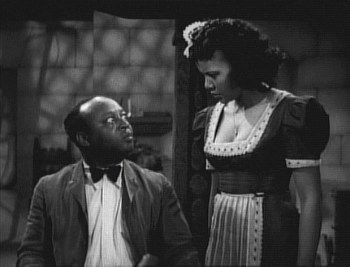There is a universe where, after Shemp Howard died, Mantan Moreland replaced him. Oh, sure, I don’t like the Three Stooges, but that’s not the point. The point is, the Stooges were popular. One of the only successful trios in comedy, in fact. 1955 was a time when Poverty Row was winding down, when fewer niche films were being made, and when Moreland’s particular style of comedy was becoming increasingly unpopular. That he might have gotten a slot in that trio is something to consider, though of course we can’t know how the scripts would have been written had Columbia Pictures not insisted one of their own bit contract players got the spot instead. Still, that he was considered at all seems worth noting.
The first time I ever heard of him was when I was looking at people who share a birthday with a friend of mine. I had actually already seen one of his movies at that point—I’ve seen at least a couple of them. I’d seen Cabin in the Sky, and I’d seen The Biscuit Eater. Possibly more than that; I seem to remember that my mom watched a fair amount of Charlie Chan when I was a kid, though that was a long time ago and I don’t remember him at all. Unfortunately, he did a lot of movies where you wouldn’t remember him at all.
The movies where you would aren’t much better. In some cases considerably worse. The fact is, Moreland played a specific persona in a lot of his movies. And that persona is based a lot on stereotypes of black people. Honestly, in at least one of the movies I’ve seen him in, he was funnier than the white characters. He’s supposed to be playing a coward in a way that rather reminds me of a Bob Hope character, but given it’s a movie with multiple murders, he’s not wrong to be afraid and the white characters just come across as stupid.
With black film comedians of a certain era, you’re left trying to see their quality within painful writing and stereotyped mannerisms. A lot of the roles I’ve watched him in strike me as being intended to evoke Eddie Anderson as Rochester. The problem is that, as time passed, Rochester became developed as a character in a way that Moreland characters don’t seem to have been. I haven’t gotten around to rewatching any of the Charlie Chan movies—the yellowface just felt like something I couldn’t take right now, especially after discovering blackface in one of the movies I did watch—but I doubt Birmingham Brown gets the same attention.
It’s hard for film history sometimes. I’m trying to look into early black performers, because I believe it’s important to remember them. The problem is the things they’re doing are generally not as worth remembering, but you don’t get to see the performers outside the performances. Moreland died in 1973, at a time when black performers who were having careers without the same kind of stereotyped performance were acknowledging those had come before, and he wasn’t given the kind of role where he could be funny without being stereotyped. I still believe he could have.

